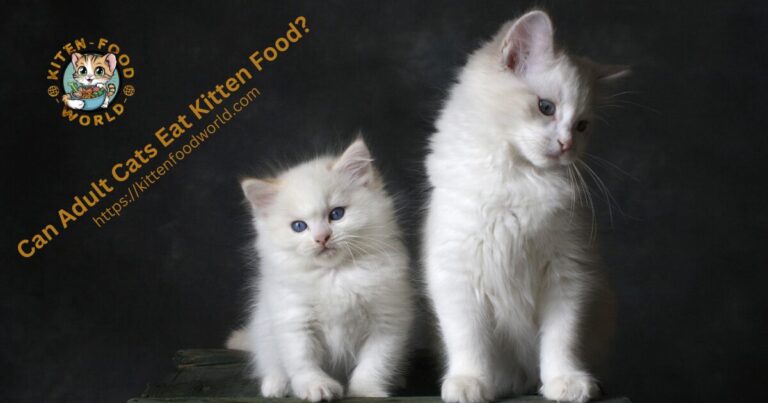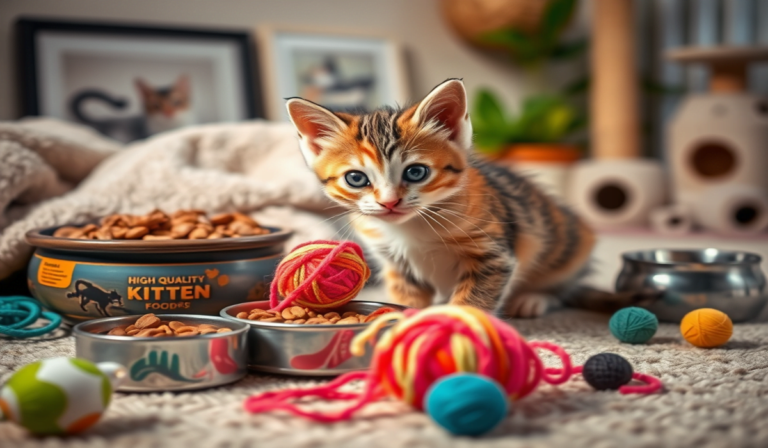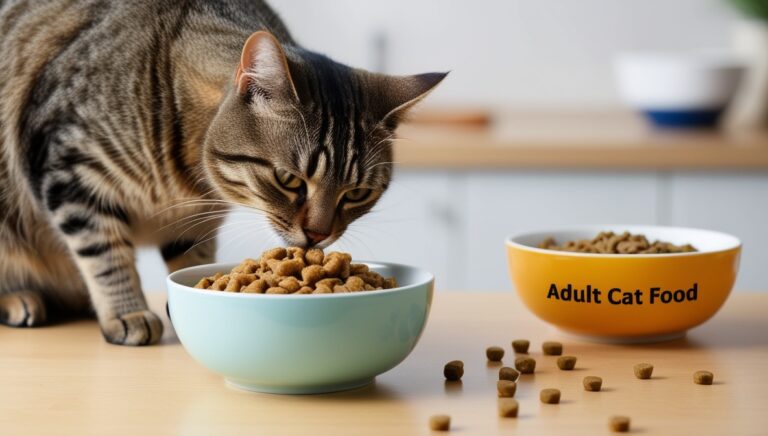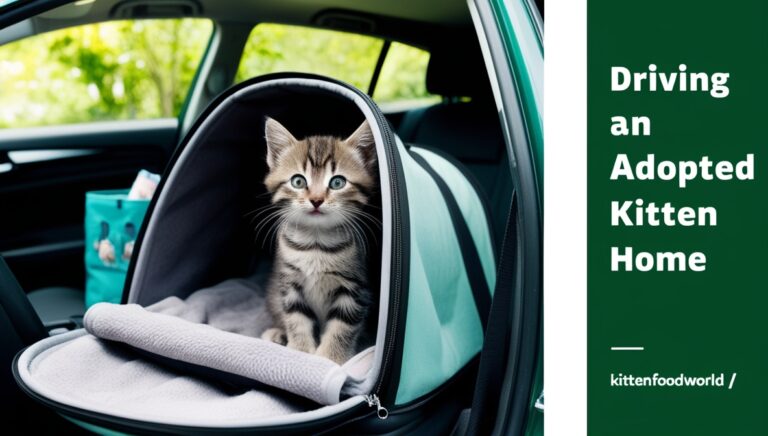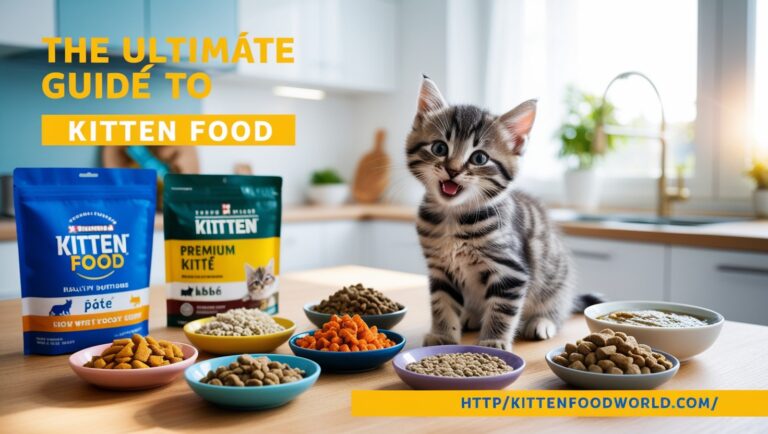What to Feed a Stray Kitten
Table of Contents
Finding a stray kitten can be both heartwarming and challenging, especially when you’re unsure about what to feed a stray kitten. These vulnerable creatures require immediate attention and the right nutrition to ensure their survival and health.
Whether you encounter a feral kitten, a wild kitten, or a stray kitten, knowing what to feed them can make all the difference. This guide will walk you through the best food options for these kittens, including what to feed a stray kitten without cat food and other emergency alternatives.
Nutrition for kittens: Understanding What to Feed a Stray Kitten
Before diving into specific food options, it’s crucial to understand the nutritional needs of a stray kitten. Kittens are in a rapid growth phase, requiring a diet rich in protein, fat, and essential vitamins and minerals.
The first thing to consider when deciding what to feed a stray kitten is whether they are still nursing or old enough to eat solid food.
- Neonatal Kittens (0-4 weeks): These kittens rely entirely on their mother’s milk or a milk replacer designed for kittens. Human baby formula or cow’s milk is not suitable as they lack the necessary nutrients and can cause digestive issues.
- Weaning Kittens (4-8 weeks): At this stage, kittens start transitioning from milk to solid food. A mix of kitten formula and soft, wet kitten food is ideal.
- Kittens Over 8 Weeks: They can begin to eat solid kitten food, which should be high in protein and specifically formulated for kittens.
What to Feed a Stray Cat Without Cat Food
Sometimes, you might find yourself in a situation where you don’t have access to cat food. Knowing what to feed a stray kitten without cat food can be a lifesaver. Here are some safe alternatives:
- Cooked Meat: Plain, unseasoned chicken, turkey, or beef can be a good temporary solution. Ensure the meat is thoroughly cooked and cut into small, manageable pieces.
- Eggs: Cooked eggs can provide a good source of protein. Avoid adding any seasoning, especially salt or spices.
- Plain Yogurt: Unsweetened, plain yogurt is a source of probiotics and protein. Make sure it doesn’t contain any artificial sweeteners like xylitol, which is toxic to cats.
- Tuna or Salmon (Water-packed, No Salt): While not ideal for a long-term diet, water-packed tuna or salmon can work in a pinch. Use it sparingly due to the high sodium content and potential mercury levels.
What to Feed a Stray Kitten Cats?
Feral or wild kittens are typically more skittish and may not have had any human contact. If you’re wondering what to feed a feral kitten or wild kitten, the same principles apply as with a stray kitten, but with a few extra considerations.
- Kitten Formula: If the kitten is very young, using a kitten milk replacer is essential. You can purchase this from pet stores or veterinary clinics.
- Wet Kitten Food: Feral kittens might be more inclined to eat wet food since it closely mimics the texture and moisture content of what they would eat in the wild.
- High-Quality Dry Kitten Food: If you cannot stay around to monitor the kitten’s eating habits, dry food is a good option as it doesn’t spoil as quickly as wet food.
- Gradual Introduction to Solid Foods: If you suspect the kitten is still very young, it may need help transitioning to solid foods. Mixing wet food with a little kitten formula can ease this process.
How to Safely Introduce Food to a Stray Kitten: What to Feed a Stray Kitten
When you first introduce food to a stray kitten, it’s important to do so in a way that won’t overwhelm them. Here are some tips:
- Start Slowly: Begin with small amounts of food to see how the kitten reacts. Overfeeding can lead to digestive upset.
- Use a Shallow Dish: This makes it easier for the kitten to access the food, especially if they are very young.
- Ensure Fresh Water is Available: Alongside food, always provide fresh water in a shallow dish. Dehydration is a common issue with stray kittens.
- Monitor the Kitten’s Condition: Pay attention to the kitten’s stool, energy levels, and overall appearance. If you notice any signs of illness, such as diarrhea, lethargy, or vomiting, consult a veterinarian immediately.
What to Avoid Feeding a Stray Kitten
What to Feed a Stray Kitten is a common question. Not all foods are safe for kittens, and some can be downright dangerous. When deciding what to feed a stray kitten, avoid the following:
- Cow’s Milk: Contrary to popular belief, cow’s milk is not suitable for kittens. It can cause diarrhea and dehydration.
- Dog Food: While it might seem like an easy alternative, dog food doesn’t have the right nutrient balance for kittens and can lead to deficiencies.
- Onions and Garlic: These can cause anemia in cats and should be strictly avoided.
- Chocolate and Caffeine: These are toxic to cats and can cause serious health issues, including seizures and death.
- Grapes and Raisins: These can cause kidney failure in cats.
Long-Term Care and Feeding of a Stray Kitten
Once you’ve figured out what to feed a stray kitten in the short term, it’s essential to consider their long-term care. If you plan on keeping the kitten or finding it a home, transitioning to a balanced diet designed for kittens is crucial.
- High-Quality Kitten Food: Invest in a good-quality kitten food that provides all the necessary nutrients for growth. Look for food that lists meat as the first ingredient and is free from fillers like corn or soy.
- Scheduled Feeding: Kittens should be fed multiple small meals throughout the day. As they grow, you can gradually reduce the number of feedings but increase the portion size.
- Regular Veterinary Check-Ups: Ensure the kitten receives regular veterinary care, including vaccinations, deworming, and spaying or neutering when appropriate.
what can stray kittens eat: What to Feed a Stray Kitten
Stray kittens require a nutritious diet to support their rapid growth and development. Ideally, they should be fed kitten-specific food that is rich in protein, vitamins, and minerals.
For young kittens (under four weeks) kitten milk replacement formula is essential, as their digestive systems are not equipped to handle solid food. They begin to wean, usually around four to five weeks, you can introduce soft, wet kitten food to their diet.
If kitten food is not available, you can temporarily provide cooked, unseasoned meats, plain yogurt, or even scrambled eggs. However, avoid cow’s milk, raw meat, and dog food, as these can cause digestive issues or lack essential nutrients.
Always ensure that fresh water is accessible, especially as the kittens transition to solid food. Proper nutrition is crucial for stray kittens to grow into healthy adult cats.
Conclusion: What to Feed a Stray Kitten
Knowing what to feed a stray kitten is crucial for their survival and growth. Whether you’re dealing with a stray, feral, or wild kitten, the key is providing a balanced, nutrient-rich diet that meets their needs.
By understanding the nutritional requirements and safe food options, you can ensure that these vulnerable animals get the best start in life.
Frequently Asked Questions.
FAQ 1: What is the best food to Feed a stray kitten?
The best food for a stray kitten is kitten-specific wet food or canned food, as it provides the essential nutrients they need to grow. If you don’t have kitten food, plain cooked chicken or turkey without any spices can be a temporary substitute.
FAQ 2: Can I give cow’s milk to a stray kitten?
No, cow’s milk is not recommended for kittens as it can cause digestive issues like diarrhea. If the kitten is very young and not eating solid food, kitten milk replacer (KMR) is the safest option.
FAQ 3: What to Feed a Stray Kitten if I don’t have kitten food?
If kitten food is unavailable, you can offer plain cooked chicken, scrambled eggs, or small amounts of unseasoned canned tuna. Always ensure the food is soft and easy to chew.
FAQ 4: Should I give water to a stray kitten?
Yes, always provide clean and fresh water for the kitten to keep them hydrated, especially if they’re eating dry food or solid meals.
FAQ 5: How do I know What to Feed a Stray Kitten very Young kitten?
If the kitten is under 4 weeks old, it will need milk replacer fed through a bottle or syringe. Look for signs of age, like closed eyes or unsteady walking, to determine their feeding needs.
FAQ 6: Can I feed dog food to a stray kitten?
Dog food is not ideal for kittens as it lacks the essential nutrients, like taurine, that they need. Only use it as a last resort and mix it with kitten food if possible.
FAQ 7: Is it safe to feed a stray kitten dry food?
Dry food is safe for kittens but should be softened with water or milk replacer for younger kittens who may have trouble chewing.
FAQ 8: How often should I feed a stray kitten?
Feed kittens younger than 8 weeks every 4-6 hours. Older kittens (8-12 weeks) can be fed 3-4 times a day. Adjust frequency based on their size and age.
FAQ 9: Can I feed bread to a stray kitten?
Bread is not a suitable food for kittens as it lacks nutrients and may be difficult for them to digest. Stick to protein-rich foods instead.
FAQ 10: Should I add supplements to a stray kitten’s food?
Most kitten food contains the nutrients they need, so supplements are generally unnecessary. Consult a veterinarian if you think the kitten requires additional support.
FAQ 11: What foods should I avoid feeding a stray kitten?
Avoid foods like chocolate, onions, garlic, grapes, and spicy or seasoned dishes. These can be toxic to kittens or upset their stomachs.
FAQ 12: Can I feed a stray kitten raw meat?
It’s better to avoid raw meat as it may contain harmful bacteria. Cooked, unseasoned meat is a safer and healthier option.
FAQ 13: How do I help a starving stray kitten gain weight?
Offer high-calorie kitten food and small, frequent meals. Wet food is often more appetizing and easier to eat for underweight kittens.
FAQ 14: What should I do if a stray kitten refuses to eat?
Try offering wet food or warming the food slightly to make it more appealing. If the kitten still refuses, consult a veterinarian immediately as it may be sick or stressed.
FAQ 15: Can I give fish to a stray kitten?
Yes, you can offer cooked, unseasoned fish like salmon or tuna occasionally. Avoid giving fishbones, as they can be dangerous.
FAQ 16: Do stray kittens need kitten formula even if they are older?
Older kittens eating solid food don’t need formula. However, if they’re under 8 weeks old, kitten formula is essential to provide the proper nutrients.
FAQ 17: Should I feed a stray kitten human baby food?
Some plain baby foods made of pureed meat (without onions, garlic, or seasoning) are safe as a temporary option. Check the ingredients carefully.
FAQ 18: How do I transition a stray kitten to solid food?
Start by mixing wet kitten food with milk replacer to create a gruel-like consistency. Gradually reduce the milk replacer as the kitten learns to eat solids.
FAQ 19: Can stray kittens eat rice or oatmeal?
Rice and oatmeal can be used as a filler but should not replace kitten food, as they lack essential nutrients. Mix them with protein-rich foods for balance.
FAQ 20: Is it okay to feed leftovers to a stray kitten?
Leftovers are not ideal, especially if they contain spices, salt, or harmful ingredients. Stick to plain, unseasoned foods suitable for kittens.
For more insights on feeding challenges, such as adult cats eating kitten food and the potential consequences, you can read this article. Additionally, explore more on our site for tips on kitten nutrition and health care to ensure a happy, healthy life for your new furry friends.
References
- SAGE Journals
- National Center for Biotechnology Information (NCBI)
- PetMD
- American Society for the Prevention of Cruelty to Animals (ASPCA)
- The Kitten Lady
- Royal Canin


